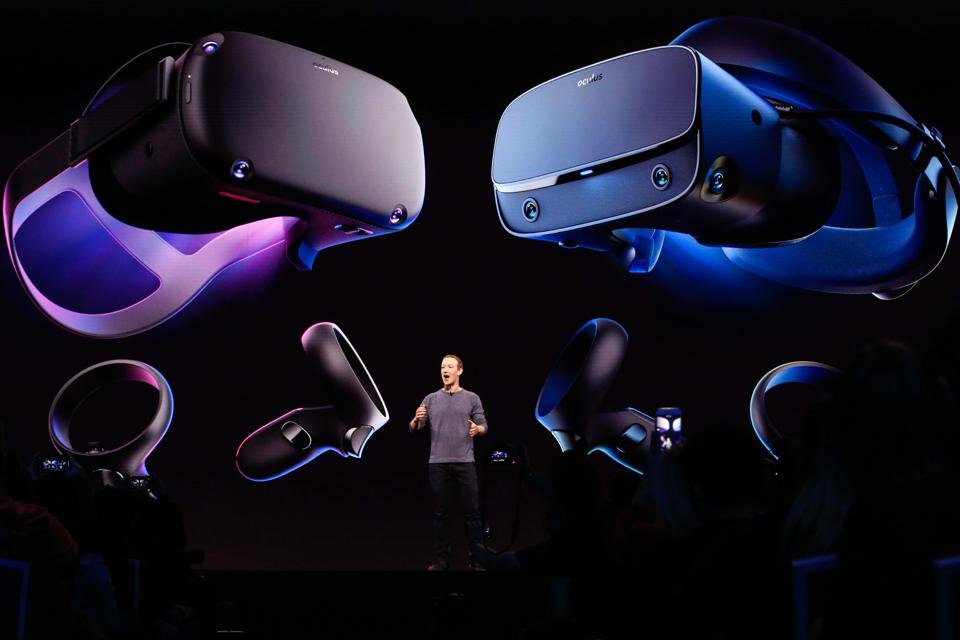Facebook announced the latest version της επιτυχημένης αυτόνομης συσκευής εικονικής πραγματικότητας (VR) Oculus Quest 2. Η νέα συσκευή διαθέτει περισσότερη υπολογιστική ισχύ και πιο ευκρινή screen than its predecessor, while it is 100 dollars cheaper.
Oculus Quest 2 is the latest step in Facebook's long-term strategy to make VR more accessible and popular.
Facebook has added VR under the umbrella of Facebook Reality Labs, and announced new applications such as Infinite Office VR for the workplace that will require you to be connected to Facebook (for future Oculus devices) to work.
Η mandatory Facebook connection is something we should pay special attention to, given the history of the largest social network with privacy and data.
VR and its cousin, augmented reality (AR), are probably the most data-mining digital sensors we'll invite to the homeus in the next decade.
Facebook acquired VR Oculus in 2014 for about $ 2,3 billion. Oculus originally targeted gamers, but Facebook boss Mark Zuckerberg wants to add VR to the social network.
At the same event last year, Zuckerberg said that Facebook sees VR as a pathway to a new kind of "social computing platform" that will use the enhanced sense of "presence" offered by VR.
VR offers a powerful sense of presence that offers new possibilities for entertainment, education, learning and connecting with others at a distance.
But the future of virtual reality is what Facebook currently has "in the lab," and it will work through the company's existing social computing platform and business model for exporting targeted ads.
Virtual reality collects real data
A VR device collects data from the user, but also from the outside world. It is one of the main ethical issues of emerging "mixed reality" technologies.
As American VR researcher Jeremy Bailenson wrote:
V Commercial VR systems typically monitor body movements 90 times per second to project the scene properly. High quality systems record 18 types of head and arm movements. As a result, spending 20 minutes in a virtual reality simulation leaves less than 2 million unique body language recordings.
The way you move your body can be used to identify you, just like a fingerprint. So everything you do in VR could be used to identify your personal identity.
Facebook Oculus Quest devices also use cameras to monitor and map their environment.
They use Simultaneous Localization and Mapping (SLAM) to monitor the device's movements in 3D. This is another opportunity for data collection from around the world.
At the end of 2019 Facebook Reported that “does not currently collect or store images or XNUMXD maps of your environment on its servers“. Watch the word today, as it shows that the company does not rule out anything for the future.
Virtual reality leads to augmented reality
Facebook wants to collect this data to facilitate its augmented reality (AR) designs.
When VR transports a user to a completely virtual environment, AR combines virtual elements with our real environment.
Last year, Facebook unveiled the Live Maps app, a vision of an extended tracking device possibly powered by AR glasses and data collected by Oculus Insight.
Live maps will offer many small conveniences to Facebook users, as they will be able to tell you where you forgot your keys.
In the video above, the Live Maps app shows the vision of an AR platform owned by Facebook.
Now, Facebook has announced its first steps in making it all a reality: Project Aria. People who wear glasses-like sensors will collect data to build what Wired co-founder Kevin Kelly calls "the mirror world", The next big technology platform.
People are rightly concerned about the moral implications of this kind of data extraction and collection. In parallel with project aria, Facebook launches Responsible Innovation Principles page (Responsible Innovation Principles) and already states that faces and license plates will be blurred in this data collection.
Monitoring by VR and AR technologies and individual privacy suits companies like Facebook because its previous failures were in the (un) ethical use of data (as in the case of Cambridge Analytica) and the asymmetric power of the platform.
We need more than just "ethical technology".
Groups like XR Safety Initiative recognize these emerging issues and have begun working on standards, guidelines and privacy frameworks to shape the development of VR and AR technologies.
Many emerging technologies face what is also known as the Collingridge problem: it is difficult to predict the various effects of a technology until it is widely developed and used, but then it will be almost impossible to control or change.
We are seeing this happening now, in efforts to regulate her power Google and Facebook.
According to David Watts, every great technology has its own rules of ethics to avoid control and responsibility:
High-level data ethics principles are not appropriate for high-tech regulation… High-tech damage can only be remedied with proper regulation.
What will be the regulation for Facebook VR technology?
Germany is giving such an answer - their antitrust rules have prevented Facebook from selling its devices. We hope that technology will not become so entrenched that it cannot be changed or challenged.
It should also be mentioned that the fines do not stop Facebook, we have seen it in the past. In today's world of multibillion-dollar technology, fines are the cost of doing business and are included in the costs.
__________________________
The article was published in The Conversation by Marcus Carter, Senior Lecturer in Digital Cultures, SOAR Fellow., University of Sydney and Ben Egliston, Postdoctoral research fellow, Digital Media Research Center, Queensland University of Technology with a Creative Commons license.
Read it original article.





